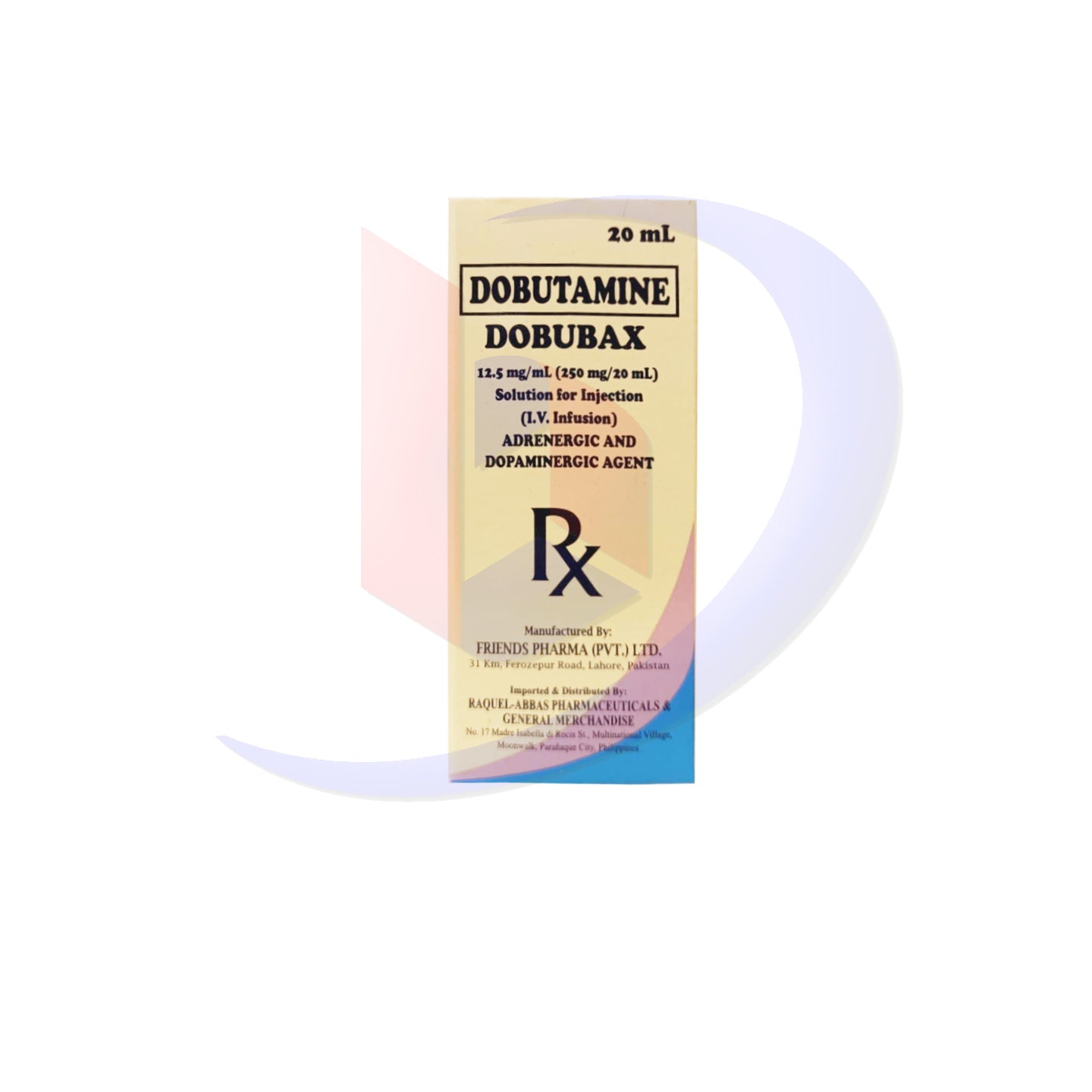Bambang Pharmaceutical Depot Inc.
Dobutamine (Dobubax) 12.5mg/ml (250mg/20ml) Solution for Injection 20ml
Dobutamine (Dobubax) 12.5mg/ml (250mg/20ml) Solution for Injection 20ml
Couldn't load pickup availability
Here is the detailed information for Dobutamine (Dobubax) 12.5mg/ml (250mg/20ml) Solution for Injection 20ml:
Product Description:
Dobutamine (Dobubax) is a sympathomimetic agent available as a 12.5mg/ml solution for injection, packaged in 20ml vials. It is primarily used to treat patients with heart failure or cardiogenic shock. Dobutamine works by increasing the strength and efficiency of the heart's contractions, enhancing cardiac output without significantly affecting the heart rate. It acts on both beta-1 adrenergic receptors (increasing heart contractility) and beta-2 adrenergic receptors (leading to vasodilation).
Indications:
Dobutamine (Dobubax) is indicated for:
-
Cardiogenic Shock:
-
It is used to improve cardiac output in patients with shock resulting from heart failure or other conditions where the heart is unable to pump blood effectively.
-
-
Congestive Heart Failure (CHF):
-
Dobutamine is administered to increase myocardial contractility in patients with acute heart failure.
-
-
Low Cardiac Output Syndrome:
-
To treat patients with conditions leading to low cardiac output such as post-cardiac surgery, sepsis, or other critical illnesses.
-
-
Stress Echocardiography:
-
Dobutamine is used in certain cases of stress echocardiography to induce temporary stress on the heart when a patient cannot exercise, helping to diagnose coronary artery disease.
-
Dosage and Administration:
The dosage of Dobutamine (Dobubax) is individualized based on the clinical response of the patient and the severity of the condition being treated.
For Cardiogenic Shock and Congestive Heart Failure (CHF):
-
Initial Dose: Start with 2.5 - 5 mcg/kg/min of dobutamine given via IV infusion.
-
Maintenance Dose: The dose can be increased up to a maximum of 20 mcg/kg/min depending on the clinical response and tolerance, typically adjusting the infusion rate every 10-15 minutes.
-
Infusion Rate: The solution can be administered through an IV drip, and the infusion rate is typically adjusted based on the patient's response. The total daily dose will depend on the clinical condition and monitoring parameters.
For Stress Echocardiography:
-
The dobutamine infusion should be started at a dose of 5 mcg/kg/min, increasing every 3 minutes by 5 mcg/kg/min until a maximum dose of 40 mcg/kg/min is reached, or until the target heart rate is achieved.
Side Effects:
While Dobutamine (Dobubax) is generally effective in increasing cardiac output, it can lead to various side effects, including:
Common Side Effects:
-
Tachycardia (increased heart rate)
-
Hypertension (high blood pressure)
-
Arrhythmias (irregular heartbeats), particularly atrial fibrillation or ventricular arrhythmias
-
Headache or dizziness due to increased cardiac output
-
Nausea or vomiting
Serious Side Effects:
-
Severe arrhythmias (which may be life-threatening, such as ventricular tachycardia or fibrillation)
-
Hypotension (low blood pressure), especially with rapid dosage increases
-
Myocardial ischemia (reduced blood flow to the heart muscle), which may lead to chest pain or angina
-
Tissue necrosis at the injection site (if extravasation occurs)
-
Acute kidney injury due to reduced renal perfusion at higher infusion rates
-
Anxiety or restlessness due to increased heart rate and blood pressure
Contraindications:
Dobutamine (Dobubax) should not be used in the following situations:
-
Hypersensitivity:
-
Contraindicated in patients with a known allergy to dobutamine or any of the excipients in the formulation.
-
-
Severe Hypertension:
-
It is contraindicated in patients with severe uncontrolled hypertension as dobutamine can increase blood pressure further.
-
-
Arrhythmias:
-
Dobutamine should not be used in patients with uncontrolled arrhythmias (e.g., ventricular tachycardia or ventricular fibrillation), as it may exacerbate these conditions.
-
-
Idiopathic Hypertrophic Subaortic Stenosis (IHSS):
-
In this condition, dobutamine may exacerbate left ventricular outflow obstruction, worsening the patient's condition.
-
-
Pheochromocytoma:
-
Patients with pheochromocytoma (a rare tumor of the adrenal gland) should avoid dobutamine, as it can cause severe cardiovascular events due to its action on catecholamine receptors.
-
-
Acute Myocardial Infarction (MI):
-
Dobutamine may not be suitable for patients with an acute MI without careful monitoring as it could increase myocardial oxygen demand, possibly aggravating the condition.
-
-
Allergic Reactions:
-
Patients with a history of severe allergic reactions to catecholamines or their derivatives may experience severe hypersensitivity responses to dobutamine.
-
Precautions:
-
Cardiac Monitoring:
-
Continuous ECG monitoring is recommended during dobutamine administration to detect arrhythmias or changes in heart rhythm.
-
Blood pressure should be monitored regularly to prevent excessive hypertension or hypotension.
-
-
Renal Function:
-
Dobutamine should be used with caution in patients with renal impairment, as it may affect renal perfusion at higher doses.
-
-
Pregnancy:
-
Dobutamine is classified as a pregnancy category C drug, meaning it should only be used during pregnancy if the potential benefits justify the potential risk to the fetus. Always consult a healthcare provider before using it during pregnancy.
-
-
Elderly Patients:
-
Care should be taken when administering dobutamine to elderly patients due to potential altered pharmacokinetics and increased sensitivity to the drug.
-
Summary:
Dobutamine (Dobubax) is a sympathomimetic drug used to increase cardiac output in patients with cardiogenic shock, congestive heart failure, and low cardiac output syndrome. It is available as a 12.5mg/ml solution for injection and should be administered via IV infusion or IM injection. The typical dosage starts at 2.5 - 5 mcg/kg/min, with a maximum of 20 mcg/kg/min based on the patient's response.
Common side effects include tachycardia, hypertension, and arrhythmias, while serious reactions may involve severe arrhythmias or myocardial ischemia. Dobutamine is contraindicated in patients with severe hypertension, arrhythmias, idiopathic hypertrophic subaortic stenosis, and other specific conditions. Careful monitoring of vital signs is essential during treatment.
As with all potent medications, dobutamine should be administered by healthcare professionals, and patient responses should be closely monitored for adverse effects and efficacy.
Share

Product Features
Highlights
Details
Lot #
Expiry Date
"For All Your Pharma And Medical Supply Needs"
-
MEDICINES
We offer large range of generics and branded tablets, capsules, topicals, suppositories, drops or suspensions, inhalers and injections.
-
SUPPLEMENTS
High quality yet very affordable vitamins and minerals, specialty supplements, herbals and botanicals, sports nutrition, and weight management.
-
MEDICAL SUPPLIES
We serve all types of medical supplies needed in clinics, laboratories, and hospitals like cottons, gauze, alcohol, swabs, gloves, bandages, lancets, glucometer, etc.
-
MEDICAL EQUIPMENT
We also serve durable and affordable medical devices and equipment needed in clinics, laboratories and hospitals.
Subscribe to our emails
Be the first to know about new collections and exclusive offers of Bambang Pharmaceutical Depot Inc.


